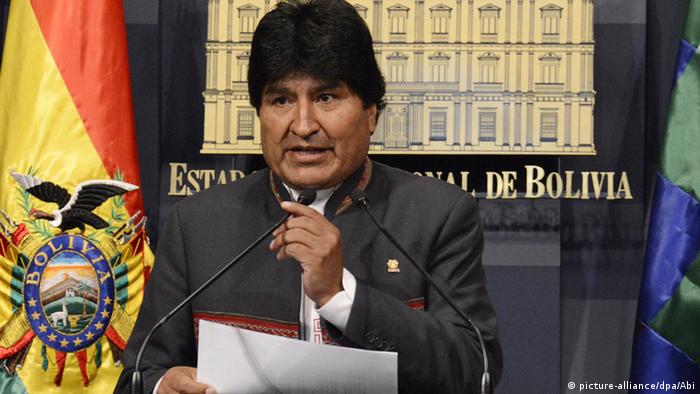Monday, February 22, 2016
Bolivia: Another example of the socialist/communist tyrannical bent. Their work is never done so they have to retain power.
Even if he were still to win, the narrow margin of Sunday's referendum is a defeat for Bolivian President Evo Morales. And the handling of the result will be the true test for the country's democracy, Uta Thofern writes.
He must be hugely disappointed. Evo, the man of the people, the eternal winner - this very man now needs to see where he can drum up another one or two percentage points. Or he needs to concede defeat. In any case, it is a bitter experience for a president who has done more for Bolivia than all of his predecessors combined.
That he was able to become head of state at all was an overwhelming victory already. Morales is the first indigenous president of Bolivia, the country with the largest proportion of indigenous people in Latin America. His election in 2006 marked a disruption of colonial structures, sending a message well beyond Bolivia's borders. During his terms in office, Morales succeeded in reducing poverty. He invested revenues gained from raw material reserves into education and welfare programs, as well as into improving infrastructure. His economic policies received international praise, and he created political stability in a country that had mostly just seen presidents come and go.
Despite his impressive track record, at least half of Bolivians do not appear to want Morales to remain in office longer than planned. At first glance, the narrow margin of Sunday's referendum to end presidential term limits seems to prove that the country is divided - roughly down the middle. On closer inspection, this result also reveals a healthy awareness of the fact that change is an integral part of democracy. Morales has become a victim of his own success: The new middle class that has emerged through his policies has developed new aspirations. Now that poverty and illiteracy are less of an issue, people seek prosperity, quality education and increased political responsibility. This appears to be the profile of those who voted no in the referendum. Though, of course, some might have been motivated by the recent allegations of corruption, or concerns over Bolivia's economic future as commodity prices plummet.
Putting it mildly, Morales rules paternalistically. Always inherent in such a governing style is the danger of arrogance - authoritarian tendencies included. It is obvious that many Bolivians, including some who voted for Morales less than a year and half ago, do not want to be patronized anymore.
President's next move
How Morales and his Movement for Socialism respond to this result will be the true test for democracy in Bolivia. If Morales wins, might he forgo another candidacy in light of the narrow margin? A majority is a majority - that's democracy, too. Even with just a one-vote majority in the referendum, the necessary constitutional amendment could be expedited, paving the way for Morales to run for a fourth term in 2019.
This doesn't mean that he would necessarily win the 2019 election. Therefore, the crucial question is whether the government will respond with repression. Bolivia's opposition already accuses the president's party of employing obstructive and defamatory tactics in the face of dissent; critical media report that they are constrained. If Sunday's referendum results in a wafer-thin majority of Morales, allegations will follow, as will protests. It would be easy for the government to react to such protests by further tightening the reins - easier, perhaps, than grooming a successor for the charismatic Morales or soliciting more support for the president by democratic means.
Evo Morales and his party are free to choose the hard road and show that they are serious about democracy.
Subscribe to:
Post Comments (Atom)





No comments:
Post a Comment